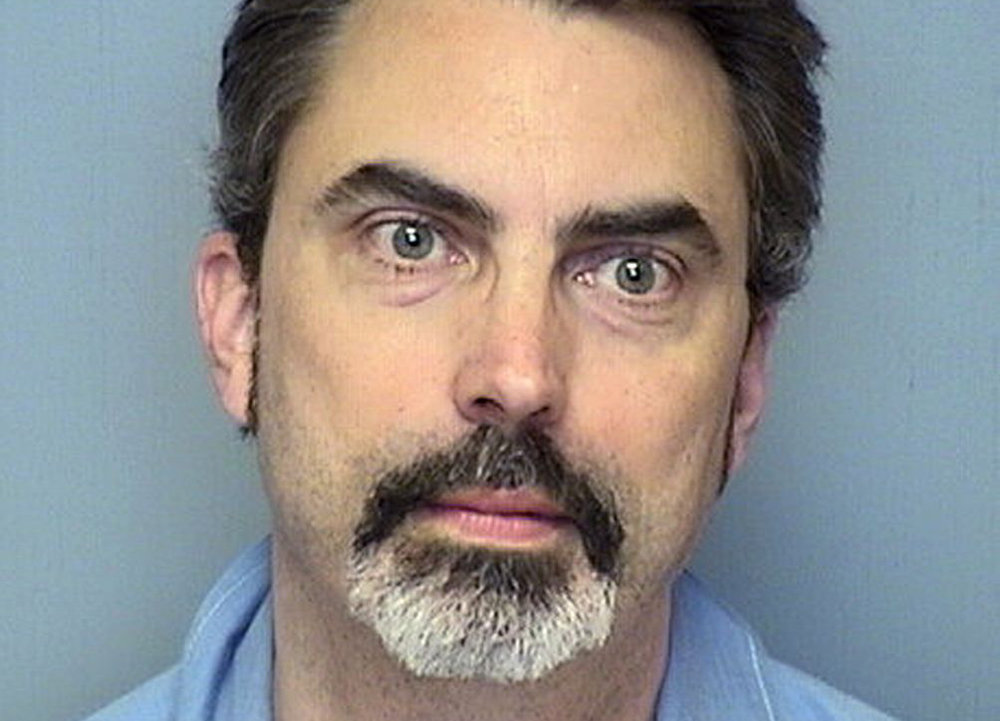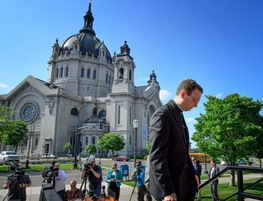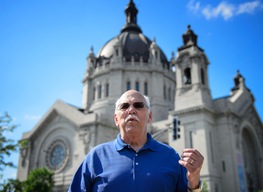Archdiocese of St. Paul and Minneapolis Charged with "Failing to Protect" Clergy Abuse Victims
By Jean Hopfensperger
The Ramsey County attorney’s office filed criminal charges Friday against the Archdiocese of St. Paul and Minneapolis for “failing to protect children” from an abusive priest, marking the first time that a U.S. archdiocese has been criminally charged for such offenses. The charges stem from the archdiocese’s oversight failures regarding former priest Curtis Wehmeyer, who is now serving a prison term. Wehmeyer sexually abused two boys in 2010 — at times plying them with alcohol and showing them pornography — while he was pastor of Blessed Sacrament Church in St. Paul. “Today we are alleging a disturbing institutional and systemic pattern of behavior committed by the highest levels of leadership of the Archdiocese of St. Paul and Minneapolis over the course of decades,” said Ramsey County Attorney John Choi. Choi called the facts of the case “appalling.” He said his office was both filing criminal charges and taking civil action because of the archdiocese’s failure to protect the boys despite “numerous and repeated reports of troubling conduct by Curtis Wehmeyer.” The archdiocese pledged to cooperate with the county attorney’s office and St. Paul police. The archdiocese likely faces fines but, for now at least, no prospect of jail time for its current or former leaders. “We deeply regret the abuse that was suffered by the victims of Curtis Wehmeyer and are grieved for all victims of sexual abuse,” Auxiliary Bishop Andrew Cozzens said in a short statement Friday.
“We will continue to cooperate with the Ramsey County attorney’s office,” Cozzens said. “We all share the same goal: to provide safe environments for all children in our churches and in our communities,” Cozzens said. ‘Precedent setting’ The Wehmeyer case was one of the most high profile involving a Minnesota priest in the past decade. In 2012, he was charged with sexually abusing two boys whose mother worked at his church. Inside his camper trailer parked outside the church, he had given the boys alcohol and marijuana, shown them pornography and engaged in sexual acts. Wehmeyer, now serving a five-year prison sentence, faces charges in Wisconsin for similar behavior with a third young man on a camping trip in 2011. The archdiocese’s failure to protect these children is part of an institutional pattern of allowing unsuitable priests to continue working in the church, and have access to children, the complaint says. In an extremely rare move, the complaint does not accuse a specific church leader, but rather the archdiocese corporation as a whole. The archdiocese is charged with six gross misdemeanors in connection with the abuse, each carrying a maximum fine of $3,000. “This is precedent setting,” said Marci Hamilton, a law professor at Yeshiva University in New York and a national expert on clergy abuse litigation. “It sends a message that these are not cases against individual priests and individual victims, it’s systemic.” The only similar legal action took place in 2003, when an Ohio judge found the Archdiocese of Cincinnati guilty of failure to report sexual abuse, attorneys said. In two other cases, against the Philadelphia and Kansas City archdioceses, an individual church leader was charged — not the entire institution. It was the archdiocese’s handling of the Wehmeyer case that prompted its former canon lawyer, Jennifer Haselberger, to report the abuse to law enforcement in 2012. Haselberger later became the key whistleblower against the archdiocese, exposing a pattern of abuse, coverups and the movement of offenders to new church assignments. “Today’s announcement should be seen as a challenge to the Catholic Church,” said Haselberger. “It should not be up to authorities alone to hold us accountable to our policies, procedures and moral values.” Long investigation The charges are the result of an intensive, 20-month investigation that involved interviews with more than 50 witnesses — both clergy and lay people — as well as the review of more than 170,000 pages of documents, said Choi. The investigation corroborated much of what has previously been reported, namely that the archdiocese officials were aware of Wehmeyer’s problematic behavior yet ordained him and allowed him to assume greater duties in church ministry. When Wehmeyer was admitted to the seminary in 1997, “seminary officials were aware Wehmeyer had a history of abusing alcohol and marijuana, experimented with other drugs, was promiscuous with men and women, was on medication for low-level depression and was in therapy,” the 44-page complaint says. In 2004, Wehmeyer approached two younger-looking men at a Barnes and Noble in Roseville, seeking to have sex. He was evaluated at a treatment center for troubled priests, and was later put on an archdiocese monitoring program.
But the archdiocese failed to enforce its own restrictions for Wehmeyer, Choi said. He cited a 2010 incident when a priest reported to Auxiliary Bishop Lee Piche that on a camping trip Wehmeyer had slept in the same bed with one of the victims. Choi said others also contacted church officials about Wehmeyer’s behavior. These facts were “ignored, minimized or not shared,” Choi said. Lack of oversight was not unusual, the complaint said. “A review of Archdiocese priest files reveals a long history of an institutional failure to prevent and responsibly respond to child sexual abuse by clergy,” said the complaint. The complaint then describes how the archdiocese addressed sex abuse allegations against four other priests now known as sex offenders: Kenneth LaVan, Robert Clark, Michael Keating and Joseph Gallatin. ‘Serious violations of law’ Since the archdiocese abuse scandal erupted in 2013, Choi’s office has declined to file criminal charges in nine cases of alleged clergy abuse, citing the age of cases and lack of evidence. Choi said he felt “very comfortable” with bringing charges against the archdiocese in the Wehmeyer case because “these facts all have occurred relatively recently … all within the statute of limitations.” St. Paul attorney Jeff Anderson, who represented the Wehmeyer victims, had been highly critical of the lack of prosecution. On Friday, he praised the county attorney. “The complaint … demonstrates and recites the problem to be a systemic one, a corporate one, by the top officials, by the Archdiocese, spanning years,” said Anderson. “It names 10 officials engaged in a pattern of conduct and alleges serious violations of law about which we have been concerned and addressing for years. “It’s bold. It’s intelligent. It’s necessary — and unprecedented,” he said. Frank Meuers, spokesman for the state chapter of the Survivors Network of Those Abused by Priests, said he was “elated’’ by the charges. However, Meuers said he would like to see the leaders of the archdiocese, not just the corporation, held accountable. Criminal charges rare Civil cases against priests have poured in since the 2013 Minnesota Child Victims Act opened a three-year window for filing lawsuits over decades-old child sex abuse claims. Criminal charges remain rare. In a Dakota County case in which criminal charges were brought, a jury acquitted a former priest last week. He was accused of abusing an altar boy in Hastings between 1989 and 1992. Several questions remain in the archdiocese case, said Charles Reid, a professor of canon and civil law at the University of St. Thomas. “Will there be a trial on these six charges — or a settlement?” asked Reid. “Will the archdiocese come in, plead guilty and pay a fine? And what else does Choi have in mind? Will he bring charges against individuals down the road?” St. Paul Police Chief Thomas Smith urged members of the public to step forward if they have information about clergy abuse. “This case is not about religion,” said Smith. “It’s about allegations of misconduct and crimes that were committed.”
|
.
Any original material on these pages is copyright © BishopAccountability.org 2004. Reproduce freely with attribution.


